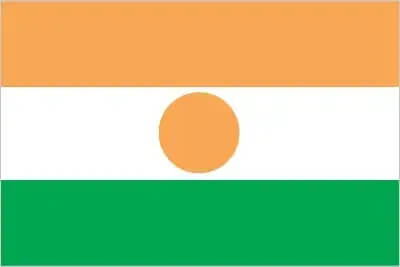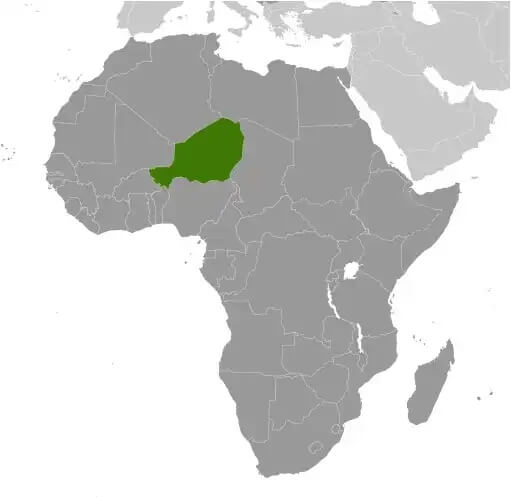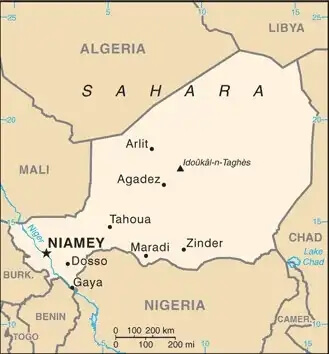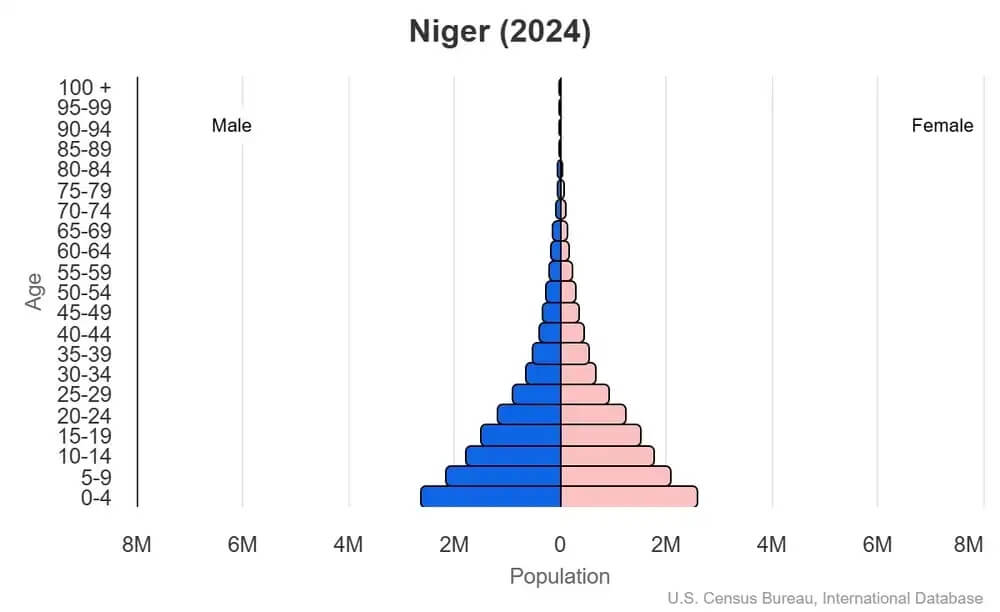World Book
Niger
World Book Index
42


With a score of 42, the country is ranked 148th out of 158 countries in the World Book ranking. (more information)
Introduction
Niger became independent from France in 1960 and has struggled to maintain a democratic system of government. It is one of the poorest countries in the world with insufficient funds to develop its resource base. The largely agrarian and subsistence-based economy is frequently disrupted by extended droughts common to the Sahel region of Africa.
Neighboring countries
Algeria - Benin - Burkina Faso - Chad - Libya - Mali - Nigeria
Geography
Area
total: 1.267 million sq km
land: 1,266,700 sq km
water: 300 sq km
Climate
desert; mostly hot, dry, dusty; tropical in extreme south
Natural resources
uranium, coal, iron ore, tin, phosphates, gold, molybdenum, gypsum, salt, petroleum
People and Society
Population
total: 26,342,784 (2024 est.)
Ethnic groups
Hausa 53.1%, Zarma/Songhai 21.2%, Tuareg 11%, Fulani (Peuhl) 6.5%, Kanuri 5.9%, Gurma 0.8%, Arab 0.4%, Tubu 0.4%, other/unavailable 0.9% (2006 est.)
Languages
Hausa, Zarma, French (official), Fufulde, Tamashek, Kanuri, Gurmancema, Tagdal
Religions
Muslim 95.5%, ethnic religionist 4.1%, Christian 0.3%, agnostics and other 0.1% (2020 est.)
Population growth rate
3.66% (2024 est.)
Government
Government type
formerly, semi-presidential republic
Capital
name: Niamey
Executive branch
chief of state: President of the National Council for the Safeguard of the Homeland (CNSP) General Abdourahame TIANI (since 28 July 2023)
head of government: CNSP Prime Minister Ali Mahaman Lamine ZEINE (since 9 August 2023)
Diplomatic representation in the US
chief of mission: Ambassador (vacant); Chargé d'Affaires Hassane IDI (since 3 August 2023)
Diplomatic representation from the US
chief of mission: Ambassador Kathleen FITZGIBBON (since 2 December 2023)
Economy
Economic overview
low-income Sahel economy; major instability and humanitarian crises limit economic activity; COVID-19 eliminated recent antipoverty gains; economy rebounding since December 2020 Nigerian border reopening and new investments; uranium resource rich
Real GDP (purchasing power parity)
$47.921 billion (2024 est.)
$44.199 billion (2023 est.)
$43.474 billion (2022 est.)
Real GDP per capita
$1,800 (2024 est.)
$1,700 (2023 est.)
$1,700 (2022 est.)
Exports
$1.223 billion (2023 est.)
$1.376 billion (2022 est.)
$1.487 billion (2021 est.)
Exports - partners
UAE 31%, France 23%, China 18%, India 6%, Sweden 5% (2023)
Exports - commodities
gold, oil seeds, uranium and thorium ore, radioactive chemicals, refined petroleum (2023)
Imports
$3.808 billion (2023 est.)
$4.194 billion (2022 est.)
$4.027 billion (2021 est.)
Imports - partners
China 26%, France 15%, India 12%, Nigeria 7%, UAE 6% (2023)
Imports - commodities
rice, aircraft parts, iron structures, refined petroleum, centrifuges (2023)
Human Development Index
The country's Human Development Index (HDI) is 0.419, ranking it 188th out of 193 countries tested. (more information)
World Happiness Report
The World Happiness Report ranked the country 124th out of 158 countries tested with a score of 4.354. (more information)



